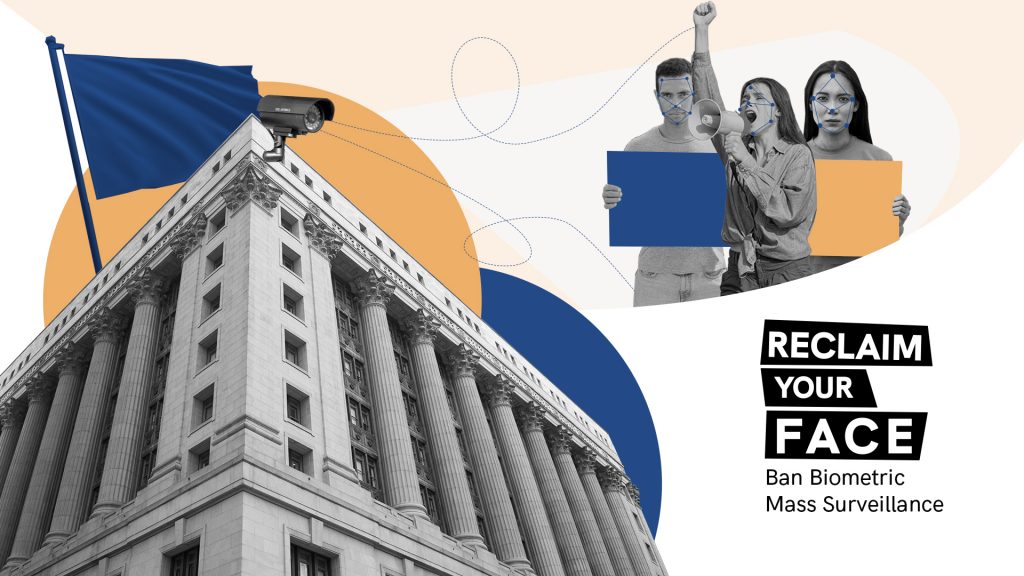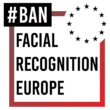About the movement
ReclaimYourFace is a European movement that brings people’s voices into the discussion around biometric data used to monitor the population. We question why these sensitive data are being used, and raise the alarm on the impact on our freedoms in public spaces
We believe in:
Public spaces where everyone can express themselves freely and without fear
Cities where politicians don't hide behind words that are difficult to understand, or behind contracts with private companies.
Countries where governments are accountable to their people.
We believe that a ban on biometric mass surveillance across Europe is the only way.
People are mobilising
Our coalition is made up of concerned people, civil society, international rights groups and like-minded campaigns, united to protect fundamental rights in the digital environment
-
Background
In Italy, the use of biometric and facial recognition technologies is already widespread on two different levels: at the national one and at municipal one. The SARI system acquired by the scientific police has proved to be immediately controversial and covered by a veil of extreme secrecy. On a local level, instead, the dystopian experiment in the city of Como was stopped by a measure of the Italian Data Protection Authority thanks also to a timely journalistic investigation—with the contribution of the Hermes Center—that underlined the importance of greater transparency on the decision-making processes behind the installation of biometric recognition technologies. Yet, other cities have already announced the installation of similar technologies, such as Turin and Udine.
Actions
Building on the results obtained in Como, the Hermes Center is calling for:- the DPA to monitor the use of biometric recognition systems by Italian municipalities;
- the DPA to immediately close the investigation opened two years ago on the SARI Real-Time system and prevent the police from using it;
- the cities of Turin and Udine to immediately publish the privacy impact assessment (DPIA) of the biometric systems they intend to install;
- the Ministry of the Interior to publish all the evaluations of the algorithms used, the usage statistics of the system, and all the data related to the type of faces in the database used by SARI;
- all metropolitan cities to commit to suspend any facial/biometric recognition project already started and prohibit the introduction of such technologies in the public spaces.
For more information, contact The Hermes Center for Transparency and Digital Human Rights.
-
✍️ Show your support by signing SHARE Foundation's petition now!
Smart surveillance cameras have been installed in the streets of Belgrade without public participation, discussion of consequences, and regardless of the principles provided by the law and the Constitution. SHARE Foundation is gathering supporters to call for a ban of biometric mass surveillance.
For more information, contact SHARE Foundation.
-
In the Czech Republic, a camera system with biometric functions is probably currently used only at Prague Airport. In 2019, Prague City Hall rejected a request from the police to install this face-recognition surveillance technology onto selected cameras in public spaces. However, the introduction of similar systems in Prague is currently being considered again - the media recently informed that in the autumn of 2020 police representatives announced that they had bought top recognition software from Cogniware. It is not yet clear, however, to what extent it will be used.
In any case, the use of biometric camera systems is currently based only on the very vague provisions of the Police Act written at the time of analog cameras while there is no sufficient legislation in the Czech Republic on new police authorization to work with digital photographs obtained from state registers.
As part of its Digital Freedom program, IuRe (Iuridicum Remedium) is currently mapping biometric identification systems in the Czech Republic, including setting up their safeguards against misuse and data leakage. After finishing the legal study, IuRe will organize a seminar in the Parliament of the Czech Republic, where it wants to clearly present the risks of biometric identification in public space to the lawmakers. IuRe stands on firm ground: in the spring of 2020, IuRe has persuaded councilors in Prague 1 to step down from securing access to houses by biometric means.
For more information, contact Iuridicum Remedium.
-
In Greece in 2020, digital rights group Homo Digitalis conducted legal actions related to biometric data processing activities of the Hellenic Police (HP). Specifically, in March 2020 the Greek watchdog filed a request for opinion to the Greek DPA regarding a so-called "smart policing" contract of the HP. This contact aims at developing smart devices with integrated software enabling facial recognition and automated fingerprint identification of individuals during police stops.
There are many reasons why the contract is so problematic: despite being worth €4 million (of which €3 million is European Union funding) to private company Intracom Telecom, no data protection impact assessment was taken out before the contract was signed, nor was the relevant data protection authority contacted. Furthermore, the HP have not been able to demonstrate the legitimacy of the contract, and it does not have a basis in Greek law. The HP claim it will be more "effecient" for identifying people - especially third country nationals (meaning people without EU nationality). But when Homo Digitalis sent freedom of information access requests to the HP, their replies were unsatisfactory. As a result, Homo Digitalis have raised a complaint about the contract with the Greek data protection authority to ask them to investigate whether the system even has a lawful basis. Regardless, the intention to use the systems especially against foreigners raises concerns that it may be used in discriminatory ways, alongside data protection and privacy concerns.
Moreover, in June 2020 Homo Digitalis filed 2 strategic complaints before the Greek DPA against a central database of the HP, which stores fingerprints of all Greek passport holders. This was done without a proper legal basis to make such an action lawful, nor was it strictly necessary and subject to appropriate safeguards.
Following these actions, the Greek DPA officially started investigating both cases in August 2020 - showing that Greek people and civil society will not stand for uses of biometric technologies that violate people's human rights.
For more information, contact Homo Digitalis.
-
In the Netherlands, the use of biometric surveillance technology is on the rise. In particular we've seen the use of facial recognition in supermarkets, at the airport and at soccer stadiums. The technology is also deployed by the police, who maintain a facial recognition database that currently offers information on 1.4 million individuals. Often, biometric surveillance technologies like facial recognition are introduced in our public space under the guise of a pilot or, especially in smart city contexts, "Living Lab", sidestepping regulatory requirements and frustrating civic engagement.
Biometric surveillance technology in public space can be used to categorize, track, control and/or identify individuals and groups of individuals. Bits of Freedom believes this practice constitutes mass surveillance and should be banned from our streets.
We're currently working at a national and a European level towards a strict ban on biometric mass surveillance in public space. We're doing that through advocacy and by raising awareness about associated risks and existing practices.
You can contribute, too. Sign up for our biometrics mailing list to receive news and calls to action.
For more information, contact Bits of Freedom
-
The civil society in Germany has been campaigning against biometric surveillance for many years. Here, we briefly present some current surveillance projects and how civil society is fighting against them.
- The German police experimented with facial recognition at Berlin Südkreuz train station. The civil society’s protest was loud and creative. The police have been severely criticized for glossing over accuracy and error rate of the surveillance system.
- Already in 2018, a group of organizations from Germany, Czech Republic and Poland criticised biometric surveillance at borders. The revised Saxon police law allows facial recognition. In 2020, the Gesellschaft für Freiheitsrechte is lodging a constitutional appeal.
- In 2020, the alliance gesichtserkennung-stoppen.de successfully protested against the German Interior Ministry’s plans to use facial recognition at 149 train stations and airports. The corresponding draft law has been put on hold.
- The police of Cologne installed high-end video surveillance in central places of the city. The local initiative kameras-stoppen.org is pursuing a lawsuit against them.
- The face search engine Clearview AI also monitors European citizen. After a complaint by a member of the Chaos Computer Club in February 2020, Clearview AI’s biometric photo database was deemed illegal in the EU.
- In August 2021, fingerprinting in ID cards will become compulsory in Germany. Digitalcourage warns of this and organizes protest.

In collaboration with our campaign partners:
























































Reclaim Your Face is also supported by:



MEP Patrick Breyer, Germany, Greens/EFA
MEP Marcel Kolaja, Czechia, Greens/EFA
MEP Anne-Sophie Pelletier, France, The Left
MEP Kateřina Konečná, Czechia, The Left
Should your organisation be here, too?
Here's how you can get involved.
If you're an individual rather than an organisation, or your organisation type isn't covered in the partnering document, please get in touch with us directly.
























































Reclaim Your Face is also supported by:



MEP Patrick Breyer, Germany, Greens/EFA
MEP Marcel Kolaja, Czechia, Greens/EFA
MEP Anne-Sophie Pelletier, France, The Left
MEP Kateřina Konečná, Czechia, The Left
Should your organisation be here, too?
Here's how you can get involved.
If you're an individual rather than an organisation, or your organisation type isn't covered in the partnering document, please get in touch with us directly.






















